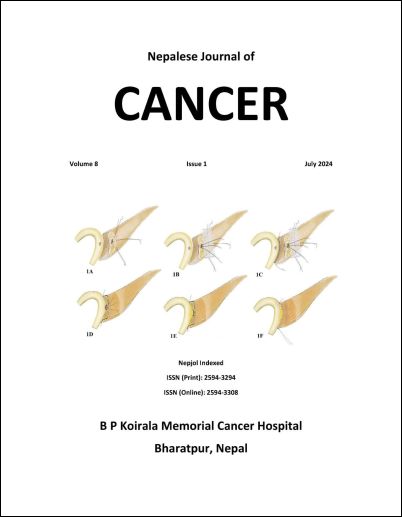Knowledge Regarding Breast Self-Examination Among Reproductive Age Women
DOI:
https://doi.org/10.3126/njc.v8i1.68243Keywords:
Knowledge, Breast Self-Examination, Reproductive Age WomenAbstract
Introduction: Breast cancer (BC) is the most common cancer and the fourth-leading cause of cancer mortality worldwide. Breast self-examination (BSE) plays an important role in the early detection of breast cancer. In developing countries like Nepal, breast cancer is diagnosed at late stages due to inadequate knowledge. Thus, this study assessed the knowledge regarding BSE among reproductive-age women.
Method: Descriptive cross-sectional study among 100 reproductive-age women of Khairahani Municipality, Chitwan. A purposive sampling technique was used to select the sample and a face-to-face interview was conducted using a structured interview schedule to collect information related to the knowledge of BSE. Descriptive and inferential statistical analysis was done using SPSS version 22.
Results: The mean age was 32.45 years and 82% were married. Likewise, 40% of women had completed primary and 35% secondary level education. Nearly half (47%) of women were homemakers and 13% had a family history of breast cancer. Out of 100 women, 72% knew the meaning and 96% knew the purpose of BSE. However, 21% of women knew the appropriate timing to perform BSE and only 20% technique of perming BSE. The majority of women had poor (48%) to moderate (36%) levels of knowledge and only (16%) had a good level of knowledge regarding BSE.
Conclusion: The knowledge regarding BSE among reproductive-age women was found poor to moderate level. Whereas, they had good knowledge on purposes and observation during procedure but had poor level of knowledge on appropriate timing and technique of BSE.
Downloads
Downloads
Published
How to Cite
Issue
Section
License
Copyright (c) 2024 Nepalese Journal of Cancer

This work is licensed under a Creative Commons Attribution 4.0 International License.
This license lets others distribute, remix, tweak, and build upon your work, even commercially, as long as NJC and the authors are acknowledged.
Submission of the manuscript means that the authors agree to assign exclusive copyright to NJC. The aim of NJC is to increase the visibility and ease of use of open access scientific and scholarly articles thereby promoting their increased usage and impact.




